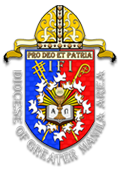JESUS THE MESSIAH
A Reflection for the 16th Sunday After Pentecost
Mark 8: 27-38

By: The Rev. Fr. Nixon Jose
Parish of the Holy Sepulchre, Paco, Manila
BACKGROUND
Mark was written around 70 AD at the time of intense Christian persecution. It was also the time in which the early Christian believers needed a strong assurance of their faith against those who humiliated and persecuted them as followers of the Person who died on the cross and was accused as a criminal.
“Mark writes for the purpose of counteracting the shame of the manner in which Jesus died. This counteraction takes the form of stressing the power of Jesus to work miracles, to cast demons, to teach astonishingly, to best his opponents in debate, to attract crowds, to predict the future, including his own fate, and to rise from the dead. As an apology, then, Mark’s Gospel is designed to convert non-Christians despite the shame of the cross.” (Robert Gundry, A Survey of the New Testament, p.27)
“The Gospel was written for us to believe that Jesus is the Christ, the Son of God. This was proven by His disciples who were eyewitnesses of those works and professed their belief in them…. The account indicated the people’s high opinion of Him, though came short of the truth, they were convinced that Jesus was an extraordinary person with divine commission.” (Matthew Henry, Commentary of the New Testament, Vol 1., p.185)
THE TEXT
Jesus asked His disciples (later called “apostles”) after they were sent by Jesus before His Ascension, on their way to Caesarea as to who He was according to the people who witnessed His teachings and miracles. While the people believed Him, the disciples fell short of who He really was. It was in this regard that Peter revealed their collective understanding from their own experiences – that Jesus was the expected Messiah!
Yet, Jesus explained to them that He was not that kind of Messiah they were expecting Him to be – a great political and powerful military ruler like David, who would restore back the Davidic kingdom without the Roman Empire; rather, someone who would be humiliated, rejected and be killed!
So Peter rebuked Him because they were expecting bigger things from him. To them, that kind of Messiah that Jesus described was a loser. To them, a Messiah was a powerful leader, a triumphant leader; not someone who would be humiliated, devastated and killed!
But Jesus rebuked Peter and called him “Satan” (meaning “tempter”) for he tried to dissuade Jesus not to do it. To Jesus, that was not the divine plan! And Jesus exhorted him and all the rest of the disciples to follow Him with conviction – even at the point of humiliation and death! For whoever should deny Him would likewise be denied also at the opportune time when they would come to Him to give an accounting of their faith!
REFLECTION
The Gospel points us to Jesus as the expected Messiah, the divine suffering Anointed One who is calling us to be firm in our conviction to follow him. Like the early Christian believers, who remained firm in their faith during the time of persecution, our Gospel also exhorts us today to be firm of the Divine Will as revealed by Jesus – to stand firm to the value of Divine Truth and the greatest good. We are confronted today with so much untruth and injustices around us at the expense of our people and country’s greatest good!
When Jesus rebuked Peter because he imposed on Jesus his own perception and standards, Jesus is now telling us today that there are much better standards to follow, i.e., values of the Divine God for our greatest good!
May our Gospel guide us to what the truth is and to discern what is happening today!


